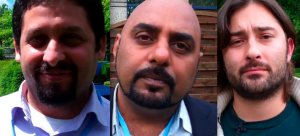Interviews: Understanding the Bonn climate talks and Looking Ahead
 The past 12 days of climate negotiations in Bonn have concluded with a mixed feeling of frustration at procedural delays but also of appreciation of progress made on substantial discussions.
The past 12 days of climate negotiations in Bonn have concluded with a mixed feeling of frustration at procedural delays but also of appreciation of progress made on substantial discussions.
To get a better understanding of what happened during this past session and what we can look forward to, I talked with representatives of the two largest networks of NGOs involved in this process.
Asad Rehman, Friends of the Earth
Asad Rehman, Friends of the Earth, highlighted for us why the lack of progress in the Subsidiary Body on Implementation is particularly frustrating as it prevented the issue of ongoing climate impacts from being discussed. Asad noted however a positive development in the fact that the energy transformation advocated by civil society is now championed in the negotiations by the Alliance of Small Islands States (AOSIS).
Looking forward, Asad is particularly hopeful that momentum will continue to build outside of the UN climate talks (and most specifically in the EU) to move away from fossil fuels and transit towards clean energy. Friends of the Earth will contribute to this movement with a Global Month of Dirty Energy organized before the conference.
Wael Hmaidan, Climate Action Network
Wael Hmaidan, director of Climate Action Network, shared this general assessment. Wael highlighted that the impossibility for the SBI to resume its work meant that more work could actually be done more rapidly on other tracks of the negotiations.
He also reminded us that this session was only preparatory with decisions to be adopted later this year at the annual climate conference in Warsaw.
Similarly to Asad, Wael emphasized that the main opportunity for climate action this year will not lie in the UN process but in parallel to it, the presence of the COP in Poland offering a unique opportunity for Poland to adopt a more adequate position, shows leadership and accept a more ambitious climate policy for the EU.
Enrique Maurtua Konstantinidis - Climate Action Network: Latin America
Looking ahead, the past weeks also provided more information who will be the key actors contributing to the facilitation of the negotiations in 2014 (this year, the COP will take place in Warsaw, in November). As the conference will take place in Latin America next year, I asked Enrique Maurtua Konstantinidis to give us a short update on the two countries (Peru and Venezuela) involved in hosting the negotiations next year. Enrique works with Climate Action Network – Latin America.
He also provided us a little bit of background on the alliances that both countries are part of and listed the two key outcomes that we would need to see next year in order to make progress towards the 2015 climate agreement: adequate mitigation pledges and commitment by developed countries to deliver climate finance.




About the author
Sébastien Duyck
Passionate environmental advocate, PhD student (Human Rights and Environmental Governance). Following particularly UNFCCC, UNEP and Rio+20 processes





